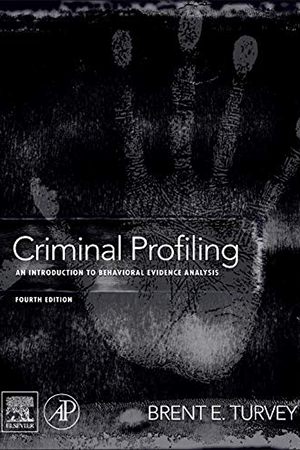
Library
Society and Technology
#gc John Green
The Anthropocene Reviewed
The Anthropocene is the current geologic age, in which humans have profoundly reshaped the planet and its biodiversity. In this remarkable symphony of essays adapted and expanded from his groundbreaking podcast, bestselling author John Green reviews different facets of the human-centered planet on a five-star scale—from the QWERTY keyboard and sunsets to Canada geese and Penguins of Madagascar. Funny, complex, and rich with detail, the reviews chart the contradictions of contemporary humanity. As a species, we are both far too powerful and not nearly powerful enough, a paradox that came into sharp focus as we faced a global pandemic that both separated us and bound us together.
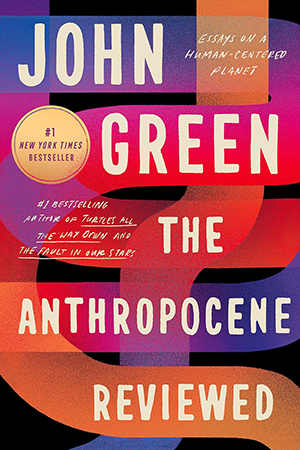
Jared Diamond
Collapse
From the author of Guns, Germs and Steel, Jared Diamond's Collapse: How Societies Choose to Fail or Survive is a visionary study of the mysterious downfall of past civilizations. Now in a revised edition with a new afterword, Jared Diamond's Collapse uncovers the secret behind why some societies flourish, while others founder - and what this means for our future. What happened to the people who made the forlorn long-abandoned statues of Easter Island? What happened to the architects of the crumbling Maya pyramids? Will we go the same way, our skyscrapers one day standing derelict and overgrown like the temples at Angkor Wat? Bringing together new evidence from a startling range of sources and piecing together the myriad influences, from climate to culture, that make societies self-destruct, Jared Diamond's Collapse also shows how - unlike our ancestors - we can benefit from our knowledge of the past and learn to be survivors.
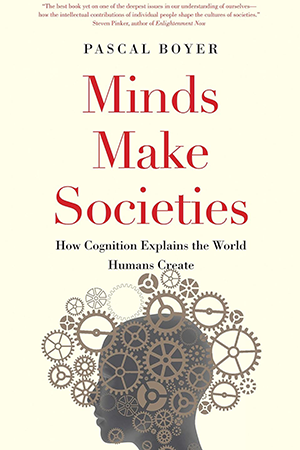
Pascal Boyer
Minds Make Societies: How Cognition Explains the World Humans Create
A watershed book that masterfully integrates insights from evolutionary biology, genetics, psychology, economics, and more to explore the development and workings of human societies There is no good reason why human societies should not be described and explained with the same precision and success as the rest of nature. Thus argues evolutionary psychologist Pascal Boyer in this uniquely innovative book. Integrating recent insights from evolutionary biology, genetics, psychology, economics, and other fields, Boyer offers precise models of why humans engage in social behaviors such as forming families, tribes, and nations, or creating gender roles. In fascinating, thought-provoking passages, he explores questions such as, Why is there conflict between groups? Why do people believe low-value information such as rumors? Why are there religions? What is social justice? What explains morality? Boyer provides a new picture of cultural transmission that draws on the pragmatics of human communication, the constructive nature of memory in human brains, and human motivation for group formation and cooperation.

Dimitry Kochenov
Citizenship
The story of citizenship as a tale not of liberation, dignity, and nationhood but of complacency, hypocrisy, and domination. The glorification of citizenship is a given in today's world, part of a civic narrative that invokes liberation, dignity, and nationhood. In reality, explains Dimitry Kochenov, citizenship is a story of complacency, hypocrisy, and domination, flattering to citizens and demeaning for noncitizens. In this volume in the MIT Press Essential Knowledge series, Kochenov explains the state of citizenship in the modern world. Kochenov offers a critical introduction to a subject most often regarded uncritically, describing what citizenship is, what it entails, how it came about, and how its role in the world has been changing. He examines four key elements of the concept: status, considering how and why the status of citizenship is extended, what function it serves, and who is left behind; rights, particularly the right to live and work in a state; duties, and what it means to be a “good citizen”; and politics, as enacted in the granting and enjoyment of citizenship. Citizenship promises to apply the attractive ideas of dignity, equality, and human worth—but to strictly separated groups of individuals. Those outside the separation aren't citizens as currently understood, and they do not belong. Citizenship, Kochenov warns, is too often a legal tool that justifies violence, humiliation, and exclusion.
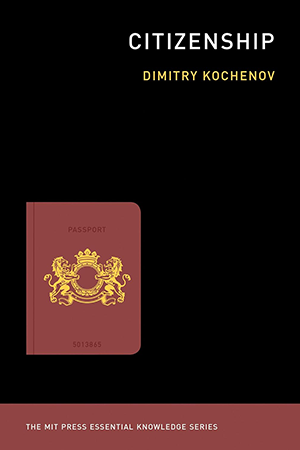
Kurt Braddock
Weaponized Words
Strengthen your understanding of the persuasive mechanisms used by terrorist groups and how they are effective in order to defeat them. Weaponized Words applies existing theories of persuasion to domains unique to this digital era, such as social media, YouTube, websites, and message boards to name but a few. Terrorists deploy a range of communication methods and harness reliable communication theories to create strategic messages that persuade peaceful individuals to join their groups and engage in violence. While explaining how they accomplish this, the book lays out a blueprint for developing counter-messages perfectly designed to conquer such violent extremism and terrorism. Using this basis in persuasion theory, a socio-scientific approach is generated to fight terrorist propaganda and the damage it causes.
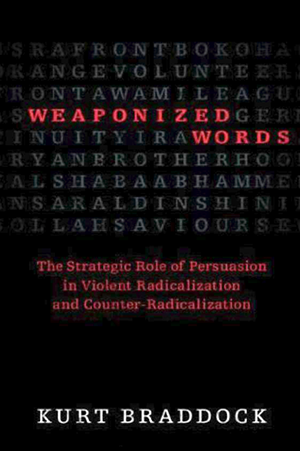
Chris Arnade
Dignity
With stark photo essays and unforgettable true stories, Chris Arnade cuts through expert pontification on inequality, addiction, and poverty to allow those who have been left behind to define themselves on their own terms. After abandoning his Wall Street career, Chris Arnade decided to document poverty and addiction in the Bronx. He began interviewing, photographing, and becoming close friends with homeless addicts, and spent hours in drug dens and McDonalds. Then he started driving across America to see how the rest of the country compared. He found the same types of stories everywhere, across lines of race, ethnicity, religion, and geography. The people he got to know, from Alabama and California to Maine and Nevada, gave Arnade a new respect for the dignity and resilience of what he calls Americas Back Row--those who lack the credentials and advantages of the so-called meritocratic upper class. The strivers in the Front Row, with their advanced degrees and upward mobility, see the Back Rows values as worthless. They scorn anyone who stays in a dying town or city as foolish, and mock anyone who clings to religion or tradition as naïve. As Takeesha, a woman in the Bronx, told Arnade, she wants to be seen she sees herself: a prostitute, a mother of six, and a child of God. This book is his attempt to help the rest of us truly see, hear, and respect millions of people whove been left behind.
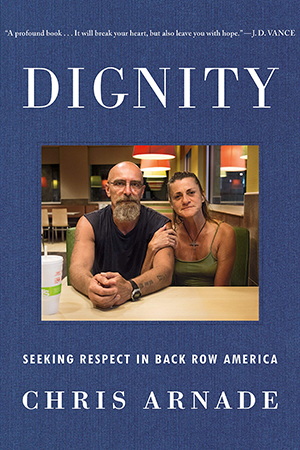
Herman Narula
Virtual Society
“A fascinating, provocative case that the metaverse will not merely transform our virtual experience—it may actually enrich the quality of our lives” (Adam Grant)—from the visionary co-founder of one of today’s most innovative technology companies “This important book offers a highly persuasive argument that the metaverse, a new kind of virtual world, marks a profound next stage in this long human quest for fulfillment through creation.”—Chris Anderson, head of TED The concept of “the metaverse” has exploded in the public consciousness, but its contours remain elusive. Is it merely an immersive virtual reality playground, one that Facebook and other platforms will angle to control? Is it simply the next generation of massive multiplayer online games? Or is it something more revolutionary? As pioneering technologist Herman Narula shows, the metaverse is the latest manifestation of an ancient human tendency: the act of worldbuilding. From the Egyptians, whose conception of death inspired them to build the pyramids, to modern-day sports fans, whose passion for a game inspires extreme behavior, humans have long sought to supplement their day-to-day lives with a rich diversity of alternative experiences. Rooting his vision in history and psychology, Narula argues that humans’ intrinsic need for autonomy, accomplishment, and connection can best be met in virtual “worlds of ideas,” where users have the chance to create and exchange meaning and value. The metaverse is both the growing set of fulfilling digital experiences—ranging from advanced gaming to concerts and other entertainment events and even to virtual employment—and the empowering framework that allows these spaces to become “networks of useful meaning.” Bloomberg Intelligence recently predicted that the metaverse will become an $800 billon industry by 2024. But its implications, argues Narula, will lead to far more awe-inspiring possibilities than a spigot of cash. The arrival of the metaverse marks the beginning of a new age of exploration—not outward, but inward—with the potential to reshape society and open the door to a new understanding of the human species and its capabilities. Rigorously researched and passionately argued, Virtual Society is a provocative and essential guide for anyone who wants to go beyond superficial headlines to understand the true contours and potential of our virtual future.
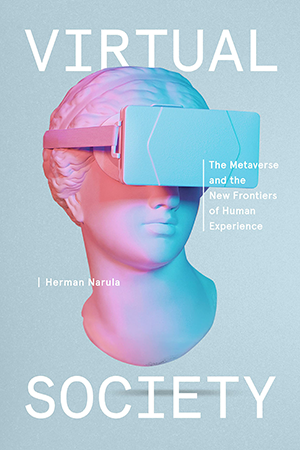
Ramesh Srinivasan
Beyond the Valley
How to repair the disconnect between designers and users, producers and consumers, and tech elites and the rest of us: toward a more democratic internet. In this provocative book, Ramesh Srinivasan describes the internet as both an enabler of frictionless efficiency and a dirty tangle of politics, economics, and other inefficient, inharmonious human activities. We may love the immediacy of Google search results, the convenience of buying from Amazon, and the elegance and power of our Apple devices, but it's a one-way, top-down process. We're not asked for our input, or our opinions—only for our data. The internet is brought to us by wealthy technologists in Silicon Valley and China. It's time, Srinivasan argues, that we think in terms beyond the Valley. Srinivasan focuses on the disconnection he sees between designers and users, producers and consumers, and tech elites and the rest of us. The recent Cambridge Analytica and Russian misinformation scandals exemplify the imbalance of a digital world that puts profits before inclusivity and democracy. In search of a more democratic internet, Srinivasan takes us to the mountains of Oaxaca, East and West Africa, China, Scandinavia, North America, and elsewhere, visiting the design labs of rural, low-income, and indigenous people around the world. He talks to a range of high-profile public figures—including Elizabeth Warren, David Axelrod, Eric Holder, Noam Chomsky, Lawrence Lessig, and the founders of Reddit, as well as community organizers, labor leaders, and human rights activists.. To make a better internet, Srinivasan says, we need a new ethic of diversity, openness, and inclusivity, empowering those now excluded from decisions about how technologies are designed, who profits from them, and who are surveilled and exploited by them.
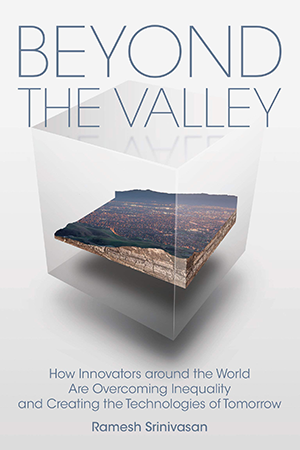
Michael Buckland
Information and Society
A short, informal account of our ever-increasing dependence on a complex multiplicity of messages, records, documents, and data. We live in an information society, or so we are often told. But what does that mean? This volume in the MIT Press Essential Knowledge series offers a concise, informal account of the ways in which information and society are related and of our ever-increasing dependence on a complex multiplicity of messages, records, documents, and data. Using information in its everyday, nonspecialized sense, Michael Buckland explores the influence of information on what we know, the role of communication and recorded information in our daily lives, and the difficulty (or ease) of finding information. He shows that all this involves human perception, social behavior, changing technologies, and issues of trust. Buckland argues that every society is an “information society”; a “non-information society” would be a contradiction in terms. But the shift from oral and gestural communication to documents, and the wider use of documents facilitated by new technologies, have made our society particularly information intensive. Buckland describes the rising flood of data, documents, and records, outlines the dramatic long-term growth of documents, and traces the rise of techniques to cope with them. He examines the physical manifestation of information as documents, the emergence of data sets, and how documents and data are discovered and used. He explores what individuals and societies do with information; offers a basic summary of how collected documents are arranged and described; considers the nature of naming; explains the uses of metadata; and evaluates selection methods, considering relevance, recall, and precision.
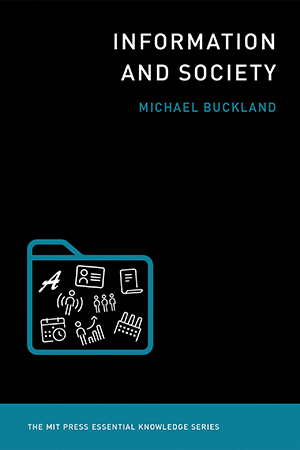
James Fox
The World According to Color
A kaleidoscopic exploration that traverses history, literature, art, and science to reveal humans' unique and vibrant relationship with color. We have an extraordinary connection to color—we give it meanings, associations, and properties that last millennia and span cultures, continents, and languages. In The World According to Color, James Fox takes seven elemental colors—black, red, yellow, blue, white, purple, and green—and uncovers behind each a root idea, based on visual resemblances and common symbolism throughout history. Through a series of stories and vignettes, the book then traces these meanings to show how they morphed and multiplied and, ultimately, how they reveal a great deal about the societies that produced them: reflecting and shaping their hopes, fears, prejudices, and preoccupations. Fox also examines the science of how our eyes and brains interpret light and color, and shows how this is inherently linked with the meanings we give to hue. And using his background as an art historian, he explores many of the milestones in the history of art—from Bronze Age gold-work to Turner, Titian to Yves Klein—in a fresh way. Fox also weaves in literature, philosophy, cinema, archaeology, and art—moving from Monet to Marco Polo, early Japanese ink artists to Shakespeare and Goethe to James Bond. By creating a new history of color, Fox reveals a new story about humans and our place in the universe: second only to language, color is the greatest carrier of cultural meaning in our world.
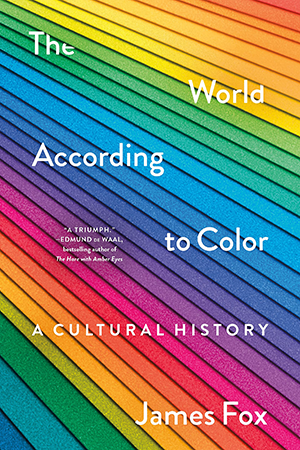
Hisham Aidi
Rebel Music
In this pioneering study, Hisham Aidi—an expert on globalization and social movements—takes us into the musical subcultures that have emerged among Muslim youth worldwide over the last decade. He shows how music—primarily hip-hop, but also rock, reggae, Gnawa and Andalusian—has come to express a shared Muslim consciousness in face of War on Terror policies. This remarkable phenomenon extends from the banlieues of Paris to the favelas of Rio de Janeiro, from the park jams of the South Bronx to the Sufi rock bands of Pakistan. The United States and other Western governments have even tapped into these trends, using hip hop and Sufi music to de-radicalize Muslim youth abroad. Aidi situates these developments in a broader historical context, tracing longstanding connections between Islam and African-American music. Thoroughly researched, beautifully written, Rebel Music takes the pulse of a revolutionary soundtrack that spans the globe.
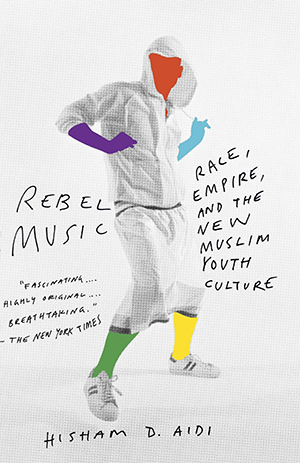
Denis De Rougemont
Love in the Western World
In this classic work, often described as The History of the Rise, Decline, and Fall of the Love Affair, Denis de Rougemont explores the psychology of love from the legend of Tristan and Isolde to Hollywood. At the heart of his ever-relevant inquiry is the inescapable conflict in the West between marriage and passion--the first associated with social and religious responsiblity and the second with anarchic, unappeasable love as celebrated by the troubadours of medieval Provence. These early poets, according to de Rougemont, spoke the words of an Eros-centered theology, and it was through this heresy that a European vocabulary of mysticism flourished and that Western literature took on a new direction. Bringing together historical, religious, philosophical, and cultural dimensions, the author traces the evolution of Western romantic love from its literary beginnings as an awe-inspiring secret to its commercialization in the cinema. He seeks to restore the myth of love to its original integrity and concludes with a philosophical perspective on modern marriage.
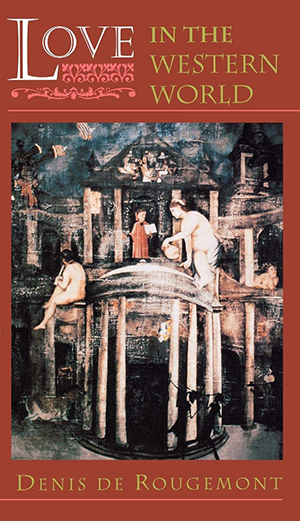
Vivek H Murthy
Together - The Healing Power of Human Connection in a Sometimes Lonely World
Humans are social creatures: In this simple and obvious fact lies both the problem and the solution to the current crisis of loneliness. In his groundbreaking book, the 19th surgeon general of the United States Dr. Vivek Murthy makes a case for loneliness as a public health concern: a root cause and contributor to many of the epidemics sweeping the world today from alcohol and drug addiction to violence to depression and anxiety. Loneliness, he argues, is affecting not only our health, but also how our children experience school, how we perform in the workplace, and the sense of division and polarization in our society.But, at the center of our loneliness is our innate desire to connect. We have evolved to participate in community, to forge lasting bonds with others, to help one another, and to share life experiences. We are, simply, better together. The lessons in Together have immediate relevance and application. These four key strategies will help us not only to weather this crisis, but also to heal our social world far into the future. Spend time each day with those you love. Devote at least 15 minutes each day to connecting with those you most care about. Focus on each other. Forget about multitasking and give the other person the gift of your full attention, making eye contact, if possible, and genuinely listening. Embrace solitude. The first step toward building stronger connections with others is to build a stronger connection with oneself. Meditation, prayer, art, music, and time spent outdoors can all be sources of solitary comfort and joy. Help and be helped. Service is a form of human connection that reminds us of our value and purpose in life. Checking on a neighbor, seeking advice, even just offering a smile to a stranger six feet away, all can make us stronger. During Murthy’s tenure as Surgeon General and during the research for Together, he found that there were few issues that elicited as much enthusiastic interest from both very conservative and very liberal members of Congress, from young and old people, or from urban and rural residents alike. Loneliness was something so many people have known themselves or have seen in the people around them. In the book, Murthy also shares his own deeply personal experiences with the subject--from struggling with loneliness in school, to the devastating loss of his uncle who succumbed to his own loneliness, as well as the important example of community and connection that his parents modeled. Simply, it’s a universal condition that affects all of us directly or through the people we love—now more than ever.
Kent E. Portney
Sustainability
A concise and accessible examination of sustainability in a range of contemporary contexts, from economic development to government policy. The word sustainability has been connected to everything from a certain kind of economic development to corporate promises about improved supply sourcing. But despite the apparent ubiquity of the term, the concept of sustainability has come to mean a number of specific things. In this accessible guide to the meanings of sustainability, Kent Portney describes the evolution of the idea and examines its application in a variety of contemporary contexts—from economic growth and consumption to government policy and urban planning. Portney takes as his starting point the 1987 definition by the World Commission on Environment and Development of sustainability as economic development activity that “meets the needs of the present without compromising the ability of future generations to meet their own needs.” At its heart, Portney explains, sustainability focuses on the use and depletion of natural resources. It is not the same as environmental protection or natural resource conservation; it is more about finding some sort of steady state so that the earth can support both human population and economic growth. Portney looks at political opposition to the promotion of sustainability, which usually questions the need for sustainability or calls its costs unacceptable; collective and individual consumption of material goods and resources and to what extent they must be curtailed to achieve sustainability; the role of the private sector, and the co-opting of sustainability by corporations; government policy on sustainability at the international, national, and subnational levels; and how cities could become models for sustainability action.
Elias Aboujaoude
Virtually You
Explores the new phenomenon of the e-personality which allows people to act online with more exaggerated confidence, sexiness, and charisma than they would in person, and discusses how real life is being reconfigured by the Internet. A penetrating examination of the insidious effects of the Internet on our personalities - online and off. Whether sharing photos or following financial markets, many of us spend a shocking amount of time online. While the Internet can enhance well-being, Elias Aboujaoude has spent years treating patients whose lives have been profoundly disturbed by it. Part of the danger lies in how the Internet allows us to act with exaggerated confidence, sexiness, and charisma. This new self, which Aboujaoude dubs our "e-personality", manifests itself in every curt email we send, Facebook "friend" we make, and "buy now" button we click. Too potent to be confined online, however, e-personality traits seep offline, too, making us impatient, unfocused, and urge-driven, even after we log off. Virtually You uses examples from Aboujaoude's personal and professional experience to highlight this new phenomenon. The first scrutiny of the virtual world's transformative power on our psychology, Virtually You shows us how real life is being reconfigured in the image of a chat room, and how our identity increasingly resembles that of our avatar.
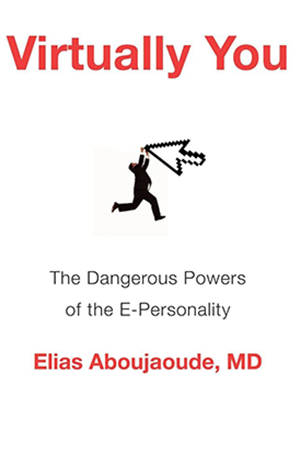
Ben Ramalingam
Aid on the Edge of Chaos
It is widely recognised that the foreign aid system - which today involves every country in the world - is in need of drastic change. But there are conflicting opinions as to what is needed. Some call for dramatic increases in resources, to meet long-overdue commitments, and to scale up what is already being done around the world. Others point to the flaws in aid, and bang the drum for cutting it altogether - and argue that the fate of poor and vulnerable people be best placed in the hands of markets and the private sector. Meanwhile, growing numbers are suggesting that what is most needed is the creative, innovative transformation of how aid works. Aid on the Edge of Chaos is firmly in the third of these camps. In this ground-breaking book, Ben Ramalingam shows that the linear, mechanistic models and assumptions on which foreign aid is built would be more at home in early-20th-century factory floors than in the dynamic, complex world we face today. All around us, we can see the costs and limitations of dealing economies and societies as if they are analogous to machines. The reality is that such social systems have far more in common with ecosystems: They are complex, dynamic, diverse, and unpredictable. Many thinkers and practitioners in science, economics, business, and public policy have started to embrace more "ecologically literate" approaches to guide both thinking and action, informed by ideas from the "new science" of complex adaptive systems. Inspired by these efforts, there is an emerging network of aid practitioners, researchers, and policy makers who are experimenting with complexity-informed responses to development and humanitarian challenges. This book showcases the insights, experiences, and often remarkable results from these efforts. From transforming approaches to child malnutrition, to rethinking processes of economic growth, from building peace to combating desertification, from rural Vietnam to urban Kenya, Aid on the Edge of Chaos shows how embracing the ideas of complex systems thinking can help make foreign aid more relevant, more appropriate, more innovative, and more catalytic. Ramalingam argues that taking on these ideas will be a vital part of the transformation of aid, from a post-WW2 mechanism of resource transfer, to a truly innovative and dynamic form of global cooperation fit for the 21st century.
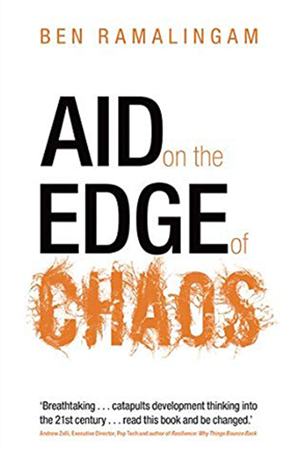
Philip McMichael
Development and Social Change
The Second Edition of this popular textbook has been conceptually reworked to take account of the instabilities underlying the project of global development. While the conceptual framework of viewing development as shifting from a national, to a global, project remains, new issues such as the active engagement in the development project by Third World elites and peoples are considered. The first four chapters cover the rise and fall of the development project around the world. The next three cover the period of globalization, from the mid 1980s onwards. The final two chapters rethink globalization and development for the 21st century. Throughout, extensive use is made of case studies.
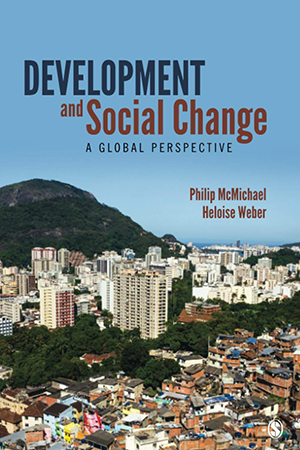
Brent E. Turvey
Criminal Profiling
Focused on Behavioral Evidence Analysis (BEA), a method of criminal profiling developed and refined by the author over the past 15 years, the fourth edition of Criminal Profiling maintains the same core foundation that made previous editions best sellers in the professional and academic community worldwide. Written from practicing behavioral analysts and aspiring students alike, this work emphasizes an honest understanding of crime and criminals. Newly updated, mechanisms for the examination and classification of both victim and offender behavior have been improved. In addition to refined approaches towards victimology, crime scene analysis, motivation and case linkage, a chapter on sexual deviance has been added as well. With prior edition in wide use as a primary text in criminal justice, law, criminology, and behavioral science programs around the world, Criminal Profiling, Fourth Edition remains essential for students and professionals alike. Outlines the scientific principles and practice standards of BEA-oriented criminal profiling, with an emphasis on applying theory to real cases. Contributing authors from law enforcement, academic, mental health and forensic science communities provide a balance perspective.
